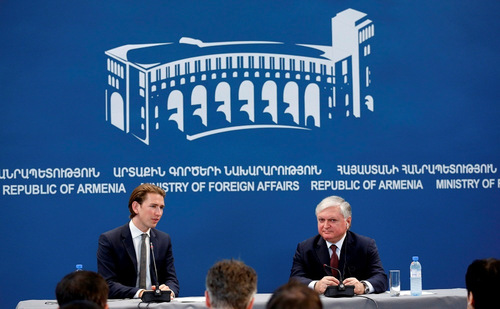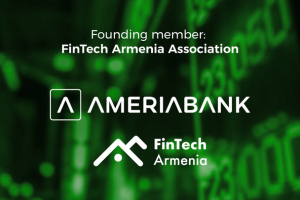Foreign Minister of Armenia held a joint press conference with the Foreign Minister of Austria. In his speech Edward Nalbandyan welcomed his Austrian counterpart Sebastian Kurz, Minister of Foreign Affairs of Austria who is on an official visit in Armenia. Nalbandyan also pointed out the exchange of views on a number of regional and international issues, as well as exchange of ideas on the ways of expanding already existing solid legal framework. There are nearly twenty agreements signed between the two countries. Foreign Ministers spoke also about the ways to intensify inter-parliamentary ties.
Afterwards Mr Nalbandyan answered to the questions posed.
Questions and answers are presented below.
Question: Mr. Nalbandian, the Declaration adopted during the NATO Summit seems to give a privilege to the territorial integrity. How would you comment on this?
And a question to both Ministers: how do you assess the agreement on establishment of ceasefire in the Southeastern Ukraine?
Edward Nalbandian: I am sure you know that NATO has declared several times that it doesn’t deal with Nagorno-Karabakh resolution process. Moreover, it has expressed its support to the approaches and efforts of the OSCE Minsk Group Co-Chairs, which have been expressed many times in the famous five Statements on Presidential level and which are in line with the Armenian position.
Two of the Minsk Group Co-Chairs are also NATO Members. Despite this during the recent NATO Summits, with some changes from summit to summit, also in the last one in Wales in the provision related to the conflicts resolution in Moldova and the Southern Caucasus, there are some expressions, which present generalized and selective approach, which doesn’t reflect the proposals of the Co-Chairs, ideas and approaches voiced by the Co-Chairs, as well as the numerous statements and decisions adopted in the framework of the OSCE during the recent years.
This of course harms the negotiation process as well as undermines regional stability and security. It also contributes that Azerbaijan is losing more and more the sense of reality and with its militaristic rhetoric and policy opposes to the approach of the international community. I would like also to note that such approach to the principles contradicts the international law, the UN Charter and the Helsinki Final Act.
Concerning the situation in Ukraine I can say that we welcome the agreement on ceasefire and we hope that it will be implemented, and they already started to be implemented, which will pave a way for finding solutions around the negotiation table, for the lasting resolution.
Question: How is the negotiation process on Armenia’s accession to the Eurasian Economic Union going on? And which role Karabakh issue is playing in that process?
Edward Nalbandian: The negotiations continue within their normal course and I think soon there will be concrete results: And on Karabakh: there were statements at the highest level both from Armenia and Russia, where it is clearly said that we don’t speak about accession of Armenia to the Eurasian Union with Nagorno-Karabakh. This question cannot be an obstacle for our accession to the Eurasian Union.
Question: Does the Armenia’s accession to the Eurasian Union mean that the chance of signing the Association Agreement with the EU is finally closed?
Edward Nalbandian: You know that during the Vilnius Summit Armenia and the EU adopted a Joint Statement, where the mutual intention to continue cooperation in all possible areas is expressed. This is our approach, and this is also the EU’s approach, and we will continue our work and efforts in this direction. Moreover, Armenian Foreign Minister and Catherine Ashton exchanged letters on this intention, where further steps are presented in more detailed way.
Photo by mfa.am.















